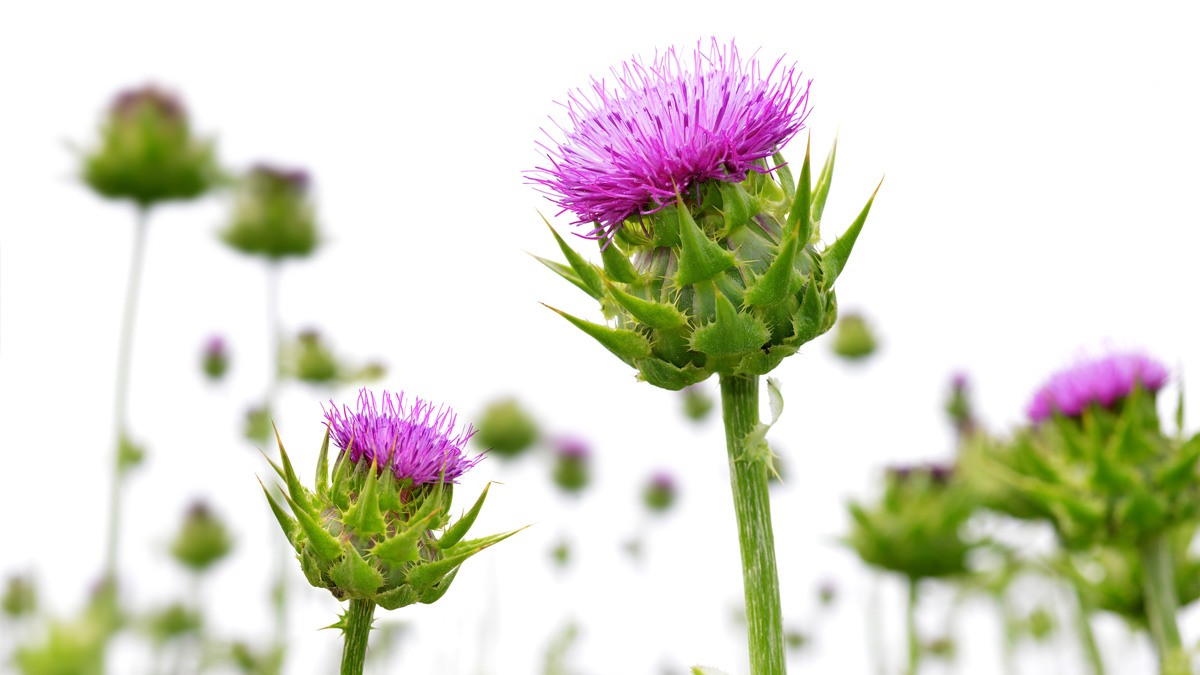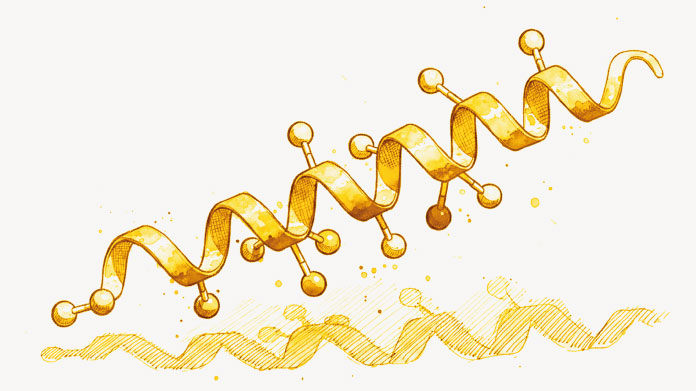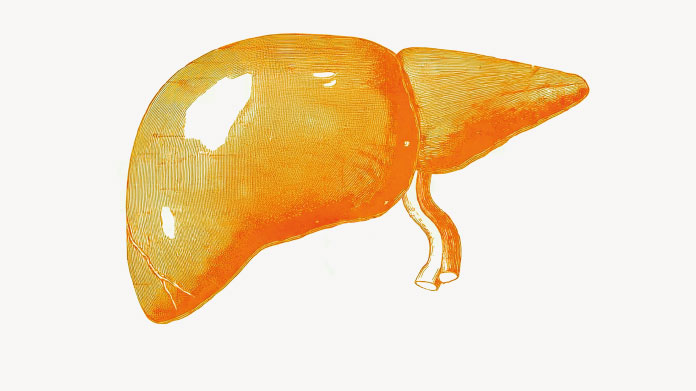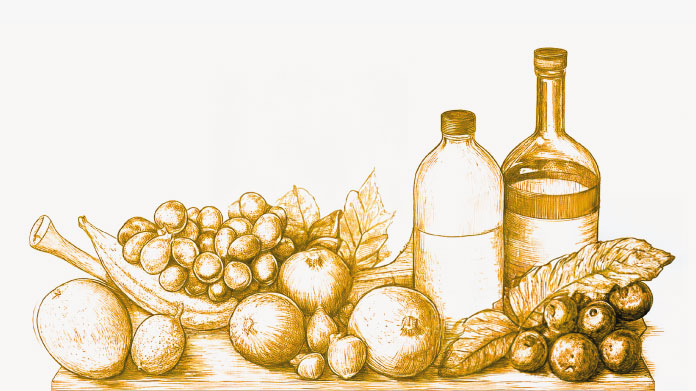4 plants with recognized benefits for liver health
The liver needs daily support to ensure it fulfillls its essential functions in the body. The following plants are an invaluable aid.

Detoxifying, synthesising proteins, metabolising glucose, storing glycogen for energy: the liver is responsible for a number of functions in the body essential to health. It’s therefore important to take good care of it. Phytotherapy offers a valuable resource for helping the liver to carry out these roles effectively. Here we focus on four plants, scientifically-recognized for their benefits for liver health.
Milk thistle, an anti-cancer plant.
Silybum Marianum is a Mediterranean plant that has been used since Ancient Greek times for its amazing pharmacological properties. These primarily come from a compound called silymarin, found in the mature seeds of the plant. This is actually a complex of three flavonoids: silychristin, silydianin and silybin. It has powerful antioxidant properties and protects the liver from attack by free radicals, one source of which is excessive alcohol consumption. Alcohol-related oxidative stress in the liver is a cause of liver cancer.
Silymarin also restricts the development of fibrosis, the accumulation of collagen in the liver which can lead to cirrhosis. In addition, it is an anti-inflammatory which means it actively fights hepatitis and non-alcoholic hepatic steatosis (NASH), a type of fatty liver disease (1).
Last but not least, silymarin helps purify the body by preventing toxins from clinging to liver cells, thus facilitating their elimination via the biliary tract (2). In short, milk thistle is an invaluable ally when it comes to maintaining the health of your liver!
In practice: milk thistle can be consumed as a tea, to be drunk three times a day. It is also found in the form of dietary supplements standardized in silymarin, which have the advantage of being more easily absorbed by the body. The dosage commonly recommended is 200 milligrams, three times a day.
Artichoke, for a sluggish liver
Artichoke, or Cynara Scolimus, is a vegetable that’s particularly popular during the summer months for its distinctive flavor. Less well-known, however, are its amazing liver-protective properties which are attributed to a particular polyphenol called cynarin. This compound is recommended for those with a sluggish liver as it stimulates production of bile, a viscous liquid essential for good lipid digestion and active elimination of waste products and toxins (3).
Artichoke leaf also plays a role in protecting liver cells, and stimulating their regeneration following mechanical or chemical damage (4).
In practice: if taken as an extract, the recommended dose is 300 milligrams, two to three times a day. Dried artichoke leaf can also be consumed as a tea - two to three cups should be enough to deliver its benefits.
Black radish, the detox secret!
Raphanus Sativa is especially recommended for protecting the liver from too rich a diet, after a particularly heavy meal, for example. It too increases bile production and improves digestion of fats. In addition, it stimulates liver enzymes responsible for ridding the body of certain particularly harmful toxins (5).
Black radish juice also has remarkable antioxidant effects (6).
In practice: black radish can be consumed in the form of a freshly-pressed juice (though beware – it has a very strong taste!), or direct from ampoules. There are few contra-indications apart from for those with a blocked biliary tract.
Chlorella, a valuable ally against heavy metals.
Chlorella Vulgaris is a green micro-algae with significant nutritional benefits. It has a very high protein content, making it an attractive option for vegetarians and vegans. In addition, it contains vitamins A, C and E, omega-3, mineral salts and trace elements, at exceptional levels for a single plant: indeed, it’s often classed as one of the select group of ‘super-foods’.
It offers multiple benefits for liver health: chlorella is recognized for its ability to chelate heavy metals (lead, mercury, arsenic …), trapping them and accelerating their elimination from the body (7).
With its high content of vitamins and phenols, chlorella has exceptional antioxidant potency, and studies have shown it to be an excellent supplement for helping to treat NASH. Indeed, chlorella has a positive effect both on cholesterol and diabetes which, together with an anti-inflammatory action, completes this ‘liver-friendly’ algae’s range of benefits (8).
To maintain the health of your liver, it’s important to eat a healthy, balanced diet, and only drink alcohol in moderation. If you have any concerns about your liver, make sure you consult a doctor to rule out any disease which might require treatment.
Though plants can provide benefits, most dietary supplements are not recommended for women who are pregnant or breastfeeding, or for children. For all others, however, we recommend the gold standard in this category: Liver Support Formula, which contains the best natural, liver-protective extracts (silymarin, chlorella, artichoke leaf …).
Attention: to avoid any potential risk of side-effects and drug interactions, be sure to seek advice from your pharmacist who will point you towards the right phytotherapeutic products and doses to ensure well-balanced liver function!
References
- Safiyeh Aghazadeh, Rahim Amini, Razieh Yazdanparast, Seyed H. Ghaffari, Anti-apoptotic and anti-inflammatory effects of Silybum marianum in treatment of experimental steatohepatitis, Experimental and Toxicologic Pathology, Volume 63, Issue 6, 2011, Pages 569-574.
- Abenavoli, L., Capasso, R., Milic, N. and Capasso, F. (2010), Milk thistle in liver diseases: past, present, future. Phytother. Res., 24: 1423-1432.
- Bekheet, S., & Sota, V. (2019). Biodiversity and medicinal uses of globe artichoke (Cynara scolymus L.) plant. Journal of Biodiversity Conservation and Bioresource Management, 5(1), 39-54.
- Aksu, Özlem & Altınterim, Başar. (2013). Hepatoprotective effects of artichoke (Cynara scolymus). Bilim ve genclik Dergisi. 10.13140/2.1.1127.9043.
- Paul R. Hanlon, David M. Webber, David M. Barnes, Aqueous Extract from Spanish Black Radish (Raphanus sativus L. Var. niger) Induces Detoxification Enzymes in the HepG2 Human Hepatoma Cell Line. J. Agric. Food Chem.200755166439-6446.
- Lugasi A, Blázovics A, Hagymási K, Kocsis I, Kéry A. Antioxidant effect of squeezed juice from black radish (Raphanus sativus L. var niger) in alimentary hyperlipidaemia in rats. Phytother Res. 2005 Jul;19(7):587-91.
- Jae-Young Shim, Hye-seoung Shin, Jae-Gab Han, Hyeung-Suk Park, Byung-Lak Lim, Kyung-Won Chung, and Ae-Son Om.Protective Effects of Chlorella vulgaris on Liver Toxicity in Cadmium-Administered Rats. Journal of Medicinal Food. Volume: 11 Issue 3: September 18, 2008.
Keywords
1 Days
The new packaging is excellent
The new packaging is excellent - finally! No more squashed boxes and torn envelopes.
GORAN
2 Days
Great Product
Great Product
Larry Garrett
6 Days
Quick shipping
Quick shipping; good price. No issues!
Mary McCarty
7 Days
Thr product is very good and is helping…
Thr product is very good and is helping me on my health. Then is always on time
LUGO Luz
10 Days
Buying was fine
Buying was fine. I had problems with the website not recognizing my login info, and had to call to get it fixed. Other than that, everything was good.
David S. Clark
10 Days
Your super maca and super ginseng are…phenomenal
Your super maca and super ginseng are phenomenal supplements that compliment each other when taking them together. Fantastic feeling of well-being and lots of mid day energy without the crash.
Keith Mason
13 Days
I have had amazing results with every…
I have had amazing results with every supplement I've purchased. I am extremely satisfied with this company
kirstin Torres
13 Days
Fine products
Fine products . They are on the leading edge of online supplements. The only issue -so far-is they sometime run out of subscription items.
Jason Argos
16 Days
The ordering process is very user…
The ordering process is very user friendly and the products always come in a timely manner.
CARTER Rhonda
17 Days
The price for Dr
The price for Dr. Pero's AC-11 is reasonable and in line with his views. (my former colleague). Keep it pure.
CAMPBELL Clayton
19 Days
Right on every time.
Right on every time.
Arthur Nicholas
22 Days
They are cheaper than everyone else and…
They are cheaper than everyone else and the shipping was fast. Great company.
Patricia Adams
29 Days
Availability of quality health…
Availability of quality health supplements and it's wide variety is impressive. Ordering is seamless and shipping even during the holidays is well streamlined.
Mohamad Hussein
43 Days
A Product worth waiting for when not…
A Product worth waiting for when not available and then arriving as a surprise!
DOMINIC
45 Days
On time shipping
On time shipping
GEORGE Verne




